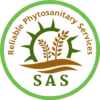Guidelines
SAI AGRI SOLUTIONS
SAI AGRI SOLUTIONS trails Standard Operating procedure (SOP), National Standards of Phytosanitary Measures (NSPM) and International Standards of Phytosanitary Measures (ISPM) for inspection of plant / plant products and regulated articles (as per pqms.cgg.gov.in/pqms-angular/home)
- NSPM 23 - Guidelines for Phytosanitary Service agency and Phytosanitary Service provider for inspection of plant /plant products in Export
- SOP for Export inspection and Phytosanitary certification of plant /plant product and regulated articles
- SOP for Export of Rice to China
- SOP for Export of Rice to USA
- SOP for Export of Peanut
- SOP Export of Dried Chilli
- SOP Export of Cut flower to Australia
- SOP Export of Pomegranate Arils to Australia
- SOP Export of Pomegranate Fruits to Australia
- SOP Export of Pomegranate Fruits to USA
- SOP for Export Inspection & Phytosanitary Certification of Vegetables & Fruits exported to EU countries
Guidelines for Treatment/Fumigation

- NSPM 9 - Forced Hot-Air Treatment facilities for wood packaging material
- NSPM 11 - Standard on Methyl bromide treatment fumigation
- NSPM 12 - Guidelines for Assessment, Audit and Accreditation of Fumigation Agencies for Undertaking Methyl bromide Fumigation
- NSPM 22 - Guidelines for Assessment, Audit and Accreditation of Fumigation Agencies for Undertaking Aluminium Phosphide Fumigation.
- ISPM 15 - Regulation of wooden packaging material for international trade.
International Standards For Phytosanitary Measures- 15(ISPM 15) is an International Phytosanitary Measure developed by the International Plant Protection Convention (IPPC) that directly addresses the need to treat wood materials of a thickness greater than 6mm, used to ship products between countries. Its main purpose is to spread the international transport and prevent diseases and insects that could negatively affect plants or ecosystems. ISPM 15 covers all wood packaging material (pallets, crates, dunnages, etc.) and requires that they be debarked and then heat treated or fumigated with methyl bromide, and stamped or branded with a mark of compliance.
